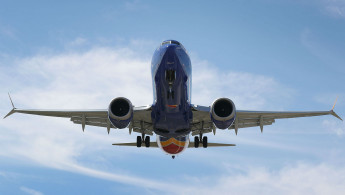Ethiopia crash fallout spreads as Boeing 737 Max jets grounded worldwide
Several individual airlines have grounded their B-737 MAX 8 aircraft but many others are continuing to fly the plane pending an investigation into the crash and possible guidance from Boeing itself.
The Nairobi-bound plane was the same type as the Indonesian Lion Air jet that crashed in October, killing 189 passengers and crew - and some officials have detected similarities between the two accidents.
There are some 350 737 MAX 8 planes currently in service around the world with more than 5,000 on order.
Australia barred Boeing 737 MAZ planes from its airspace while in Britain authorities said that "as a precautionary measure" on the plane, they had decided "to stop any commercial passenger flights from any operator arriving, departing or overflying UK airspace".
France, Ireland, Netherlands, Singapore, Malaysia and Germany banned all 737 MAX 8 planes from their airspace, while China suspended operation of the model until after "confirming the relevant measures to effectively ensure flight safety".
 |
The weekend crash sent Boeing shares nosediving as much as 12 percent on Monday, wiping billions of dollars off the market value of the company |  |
Indonesia said it was grounding 11 jets of the 737 MAX 8 type, with the planes not operational until they were cleared by safety regulators, Director General of Air Transport Polana Pramesti said.
Oman suspended Boeing 737 MAX flights "until further notice" and the Mongolian Civil Aviation Authority said it had ordered the grounding of the sole Boeing 737 Max 8 aircraft in its national carrier's fleet.
A number of global airlines also decided to suspend the operation of B-737 MAX jets, including Aerolineas Argentinas, Aeromexico, Cayman Airways, South Africa's Comair, and South Korea's Eastar Jet.
Twitter Post
|
Brazil's Gol Airlines, Icelandair, Norway's Air Shuttle, Germany's TUI, and Turkish Airlines also followed suit.
Ethiopian Airlines said Monday it had grounded its Boeing 737 MAX 8 fleet "until further notice".
"Although we don't yet know the cause of the accident, we have to decide to ground the particular fleet as an extra safety precaution," said the state-owned carrier, Africa's largest.
No ban on B-737 MAX planes
The US Federal Aviation Administration said it would not make any decision until it has more evidence.
"No updates so far. We continue to be involved in the accident investigation and will make decisions on any further steps based on the evidence," FAA spokesperson Lynn Lunsford told AFP.
US President Donald Trump also waded into the dispute, writing on Twitter that "airplanes are becoming far too complex to fly" with "pilots no longer needed, but rather computer scientists from MIT".
"I don't know about you, but I don't want Albert Einstein to be my pilot. I want great flying professionals that are allowed to easily and quickly take control of a plane!"
Boeing, which has sent experts to assist in the Ethiopia probe, said safety is its "number one priority".
"The investigation is in its early stages, but at this point, based on the information available, we do not have any basis to issue new guidance to operators," it said in a statement.
 |
Around 40 percent of the in-service fleet of 371 Boeing 737 Max jets have been grounded globally |  |
More than £21 billion has been wiped off the company's market value since close of trading on Friday.
Southwest Airlines, which operates 34 of the 737 MAX 8 planes, said: "We remain confident in the safety and airworthiness of our fleet of more than 750 Boeing aircraft."
A source told AFP that American Airlines planned to continue operating its two dozen 737 MAX 8s.
The UAE's Flydubai airline said it was "monitoring the situation" and it was "confident in the airworthiness of our fleet".
India's aviation regulator said on Monday that it had imposed additional "interim" safety requirements for ground engineers and crew for the aircraft but stopped short of ordering their grounding.
Twitter Post
|
Indian airline SpiceJet, which flies 13 B-737 MAX 8 planes, jumped to the defence of the plane, calling it "a highly sophisticated aircraft".
Air Italy said it would follow all directives "to ensure the maximum level of safety and security". In the meantime, its planes remain in the air.
Russian airline S7 said it was closely following the crash investigation and was in contact with Boeing, but had received no instructions to stop flying the 737 MAX 8
'Significant industry impact'
Boeing has described the MAX series as its fastest-selling family of planes, with more than 5,000 orders placed to date from about 100 customers.
But not since the 1970s - when the McDonnell Douglas DC-10 suffered successive fatal incidents - has a new model been involved in two deadly accidents in such a short period.
The weekend crash sent Boeing shares nosediving as much as 12 percent on Monday, wiping billions of dollars off the market value of the company.
"I think the impact for the industry is significant," said Gerry Soejatman, a Jakarta-based aviation analyst.
"We have a new type of aircraft - that type of aircraft has only been in service for two years - and... we have two accidents with seemingly similar circumstances."
Around 40 percent of the in-service fleet of 371 Boeing 737 Max jets have been grounded globally, Flightglobal reported.
Agencies contributed to this report.





 Follow the Middle East's top stories in English at The New Arab on Google News
Follow the Middle East's top stories in English at The New Arab on Google News
![The UAE is widely suspected of arming the RSF militia [Getty]](/sites/default/files/styles/image_330x185/public/2024-11/GettyImages-472529908.jpg?h=69f2b9d0&itok=Yauw3YTG)
![Netanyahu furiously denounced the ICC [Getty]](/sites/default/files/styles/image_330x185/public/2024-11/GettyImages-2169352575.jpg?h=199d8c1f&itok=-vRiruf5)
![Both Hamas and the Palestinian Authority welcomed the ICC arrest warrants [Getty]](/sites/default/files/styles/image_330x185/public/2024-11/GettyImages-2178351173.jpg?h=199d8c1f&itok=TV858iVg)